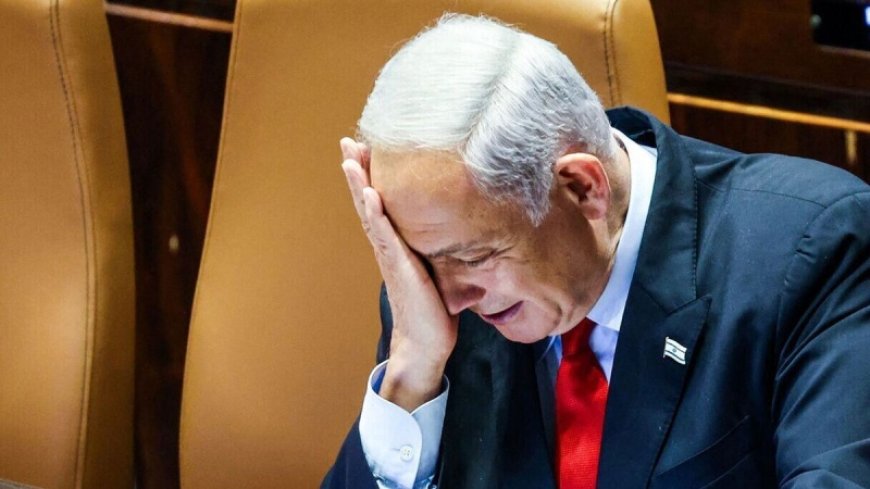Israel’s Crumbling Powerhouse: Espionage, Corruption, and Chaos Inside Netanyahu’s Administration

By: H. Zaïm-Bashi
The shocking breach of Israeli military intelligence allegedly originating from the very core of Prime Minister Benjamin Netanyahu’s office has cast a harsh light on the disarray infighting and chronic insecurity embedded in Israel’s political and security apparatus. Reported extensively by Israeli television and radio the incident has uncovered deep fractures between Israel’s political leaders and its security establishment hinting that the situation extends far beyond the occupied territories and exposes a profound unease running through Israel’s leadership ranks.
Reports suggest that highly sensitive military intelligence was stolen directly from the country’s intelligence networks and is believed to have circulated among Netanyahu’s inner circle before finally reaching foreign media---a staggering failure of security in a country that prides itself on intelligence prowess. Soon after Hebrew media disclosed that one of Netanyahu’s senior advisors was detained accused of leaking these classified details. With five top officials now arrested and under interrogation it’s becoming increasingly apparent that Israel’s once-vaunted leadership is crumbling under the weight of its own contradictions and lapses.
Israel’s armed forces for all their hardline posturing are seemingly in the throes of a security crisis that has prompted some officials to look beyond their own ranks for leadership. As reported in Yedioth Ahronoth Chief of the General Staff Herzi Halevi is even considering candidates from outside the Israeli military to lead Unit 8200 Israel’s elite foreign intelligence division---a desperate move following the resignation of the previous commander Yossi Sariel.
Sariel's departure comes after an embarrassing internal investigation into his role in the massive intelligence failure surrounding the October 2023 Operation Al-Aqsa Storm. The ongoing turmoil has prevented even the appointment of his successor as senior military commanders grapple with an ever-widening chasm of distrust.
Meanwhile Iran’s alleged ability to infiltrate Israel’s upper echelons has reportedly pushed Israeli authorities to scramble for damage control. Heightened anxieties over Iranian espionage networks have led the head of Israel’s prison authority to secure a maximum-security facility specifically for those implicated in breaches of national security notably those accused of aiding Iranian intelligence. This decision follows a wave of arrests of Israeli citizens accused of collaborating with Iran in various covert operations---a testament to Israel’s deeply compromised internal security. Iran has responded with characteristic defiance reiterating its commitment to respond forcefully to any Israeli aggression.
But the troubles extend beyond infiltration: corruption and financial inducements have become Israel’s Achilles’ heel. Economic pressures have made it all too easy for certain Israeli citizens and even some military personnel to accept bribes in exchange for leaking sensitive information. Investigations reveal that some individuals---ranging from former soldiers to current officials---have betrayed national secrets for paltry monthly sums while others allegedly traded vital data for cryptocurrency. These breaches have reportedly provided anti-Israel resistance forces with precise coordinates for some of Israel’s most highly classified sites exposing the extent to which corruption has pervaded Israeli ranks.
Adding to Israel’s woes are reports of sophisticated cyber-operations by Palestinian resistance forces. Channel 12 recently exposed a two-year cyber campaign aimed at Israeli soldiers through which Palestinian groups are believed to have gleaned valuable information from soldiers’ mobile devices---data that may have facilitated the planning of Operation Al-Aqsa Storm. Following this revelation Israel’s military is now grappling with a security nightmare conducting urgent internal reviews of data protection protocols and demanding greater vigilance among personnel.
In the wake of these failures Israel’s recent attack on Iranian military and intelligence sites has stoked fears within its leadership. Understanding Iran’s resolve to defend its territorial integrity Israeli officials are bracing for retaliation with several high-ranking officials---particularly those directly involved in the strikes against Iran---now under tight security. These anxious preparations reveal the depth of Israel’s fears over Iran’s influence fully aware that Tehran is neither idle nor intimidated by Israeli provocation.
In the shadow of these cascading crises Israel’s leadership faces a reckoning it has long postponed. The country’s military and intelligence structures once pillars of Israel’s claim to stability and security now reveal fractures and failures at every turn. This spiraling security crisis---spanning the political military and intelligence spheres---has exposed the growing fissures within Israel’s power structure and suggests that Israel’s claims to invincibility are rapidly unraveling in a region increasingly prepared to challenge it.













































